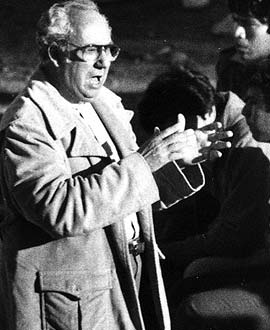Rafael Martinez
"Angel de los Cerros"
1923-2008
A native of Cuba, Rafael Martinez enjoyed a long and successful career as both a minister and a professor of romance languages prior to his retirement in 1983 at the age of 60. He and his wife Wilma moved to Solana Beach, CA where he saw and responded to the needs of immigrants living in the area. Rafael founded the North County Chaplaincy and joined numerous national boards in order to bring recognition to the issues related to lack of health care for Hispanic immigrants and farmworkers. The Chaplaincy would help immigrants gain access to health care services, housing, clothing, spiritual guidance, education and employment resources.
Reverend Martinez expended personal time, money, energy and resources in order to assist individuals and families living in makeshift shelters across the canyons of northern San Diego County, California. Despite having seen the favelas of Rio de Janeiro and the Villa Miseria in Buenos Aires, Rafael was appalled to witness the living conditions of immigrant populations residing in one of the wealthiest regions of the United States. Often his efforts addressed the most basic of human needs – delivering babies in emergency situations, running potable water to a makeshift camp called “El Diablo” and bringing food and clothing into the canyons.
Rafael was appointed by then US Secretary of Health and Human Services, Donna Shalala, to serve on the National Advisory Council of Migrant Health, advising the Secretary on policy and funding issues related to farmworkers. Rafael spoke out in support of the immigrant community on television programs such as 20/20 and the Don Francisco “Sabado Gigante” show on Spanish Language television. His dedication extended to the national struggle of farmworkers in the United States in 1994 when he became a member of the NCFH (National Center for Farmworker Health) Board of Directors.
Rafael Martinez continues to inspire the Health Center Movement; his life and mission stand as a testament to the courage of farmworkers throughout the United States.
